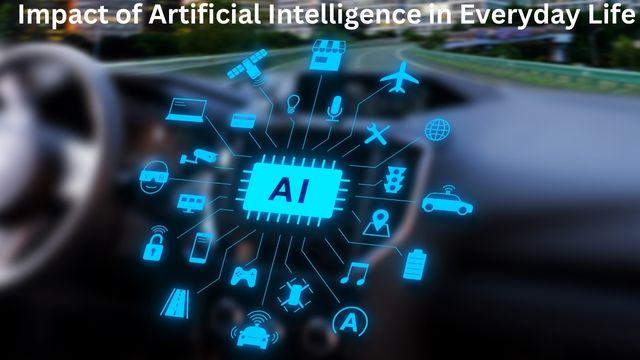Impact of Artificial Intelligence in Everyday Life

The Impact of Artificial Intelligence in Everyday Life: In many respects, artificial intelligence improves our lives in terms of safety, convenience, and health. However, it can also seriously jeopardize our rights and the fabric of society. Here are some effects it may have on daily life and potential outcomes.
Until recently, artificial intelligence (AI) was a concept reserved for science fiction. It was used by spaceship commanders to find “wormholes” and understand alien species that existed throughout the universe. In a sense, we’re all spacecraft commanders today.
We utilize AI to identify solutions to challenges in our daily lives, including the quickest route from our home to our job, reading web pages written in another language, looking up information we need, and a variety of other uses.
The growth of AI is typically praised for making tasks much simpler and time-consuming. But there is a cost associated with this. Our civilizations are faced with significant ethical, social, and legal difficulties and risks from AI. It is important to carefully evaluate, minimize, and in certain circumstances, remove these difficulties and dangers.
What Is AI?
To develop clever machines devices and systems capable of executing complicated tasks that frequently require human intelligence in a way that equals or exceeds the capabilities of humans artificial intelligence, or AI, is a branch of computer science that combines various disciplines.
Artificial intelligence can be divided into two primary categories: strong artificial general intelligence and weak artificial general intelligence (AGI).
All present applications of artificial intelligence fall under the category of narrow or weak AI. It includes devices and systems created or configured to excel at a single activity, such, says, facial recognition. Weak AI for facial recognition is unable to tell houses, vehicles, or other items apart even though it can recognize faces faster or more accurately than a person.
Strong AI, often known as artificial general intelligence (AGI), is the ideal state in which intelligent robots will be able to carry out a wide variety of tasks at levels well above those that a person is capable of. It’s a stage of AI development that we haven’t yet attained.
Impact of Artificial Intelligence in Everyday Life
- Robotic chefs
- Facial recognition technology
- Personalized shopping
- Sex robots/sex bots
- Smart homes
- Digital voice assistants
- Google internet search
- Sending emails and messages
- Healthcare
- Streaming apps
Robotic chefs
Unbelievably, there are already robotic cooks available on the market. Although the technology is currently expensive, it may advance over the next few years, much to how automatic check-out machines proliferated throughout supermarkets.
By the way, did you know that the spouse of the person who invented ATMs never uses them and instead visits her neighborhood branch to collect cash? Although technology may speed up processes, a lack of chance encounters with other people might hurt how well our lives are going.
Many workers in the hospitality industry may become unnecessary as a result of technology, and for those few positions that remain, there may be issues with occupational dangers and the resulting legal ramifications.
The issue of privacy will therefore be the proverbial “elephant in the room.” What happens when the automated system’s sensors and cameras capture sensitive personal data about customers and/or employees? Enabling such customization may result in the realization of important medical information, such as allergy or illness records for which absolute confidentiality is the only workable solution.
Facial recognition technology
Through either face recognition features built into smartphones or CCTVs installed in public spaces, facial recognition technology has progressively merged into our daily lives. The AI functionality in cell phones is typically used to lock and unlock access.
The information is only there to spare you from having to type in a password or security code; it never leaves your device. It seems very innocent, don’t you think? Although it may be worse, it is by no means innocent. When you are sleeping, someone may unlock your phone by merely displaying their face.
Data on your phone may be accessed by unauthorized parties if the technology is overcome. Furthermore, it could mainstream face scanning, making the thought of having your face scanned by others less and less frightening.
The technology, which is linked to CCTVs, is typically justified by “security concerns.” The effectiveness of technology in deterring crime is under debate. However, even a facial recognition system that worked flawlessly and did not include systemic prejudice (as it appears to do in our current systems) would be intolerable.
Such systems put one’s freedom of expression, privacy, and right to anonymity at risk. Under constant observation, it is impossible to have a fulfilling life, express and share potentially divisive or critical opinions of the government, or simply be oneself.
Personalized shopping
How does Amazon know that I was considering buying that pair of white Nikes only moments ago? Online retailers frequently employ AI technologies to generate specialized consumer suggestions.
Your surfing habits, preferences, and interests are collected by websites, which also monitor your behavior on the websites and mobile apps of other businesses. With the aid of AI, businesses can more quickly and intelligently sift through petabytes of data to forecast customer behavior and provide personalized suggestions to specific customers.
To give the customer a tailored purchasing experience, this level of intelligence is essential. Is this advantageous? It is quite comfortable.
However, the amount of information that digital corporations collect about us and how their profiling, in combination with vested financial interests, might work against us are undoubtedly quite troubling. Additionally, don’t you occasionally like to think outside the box and wear some daring outfits? What about zebra-patterned neon-pink Vans, for instance?
Sex robots/sex bots
Although likely, you haven’t seen one yet, AI-powered sex toys are currently available on the market. The creators and manufacturers of these toys claim that they are safe and that playing with them can be beneficial in reducing adverse effects on mental health.
Some people think that by giving both men and women a place to express their excessive urges, these robots will eradicate sexual harassment and other associated crimes.
Scientists and specialists, such as those from King’s College London’s Women’s Health Academic Centre and St George’s University Hospitals National Health Service (NHS) in London, caution that such upbeat viewpoints are unsupported by research.
The proliferation of these robots may very well normalize rape. Sex robots also offer a serious threat to privacy, and anonymity, and run the possibility of falling victim to cyber-hacking and cyber-blackmail.
Smart homes
Homes are becoming “smart,” much like phones. When we arrive home from work or school, our optimum temperature is waiting for us since our thermostats have learned about our tastes and daily routines.
Some refrigerators generate shopping lists for you depending on what’s lacking and suggest wines to match your meal. Naturally, voice-controlled digital assistants can be linked to your smart systems and gadgets so that all you have to do is say “more light” to have more light appear.
Smart homes, however, can be harmful. You cannot hack a heating system that has a manual turn switch. Your heating system’s Internet connection is capable. The only thing your ancient refrigerator can do is keep your food cold. Without your knowledge, your smart refrigerator could start secretly mining cryptocurrencies.
Digital voice assistants
We all use digital voice assistance occasionally, and it can be found in the majority of cell phones. They enable voice-activated searches and voice-synthesized information retrieval for the user. There are also distinct digital voice assistants in quite a few first-world homes that can be used to turn on and off the radio, book rail tickets, or send messages to loved ones.
They are not, however, at all secure for use. Digital voice assistants have reportedly sent 1,700 private audio files to other users without their consent or recorded private conversations and sent them to a random number in the address book.
Google internet search
Most of us can’t go a day without looking something up on Google, whether it’s a product we can’t live without or an answer. Without the use of artificial intelligence, search engines couldn’t search the entire internet and give what you’re looking for.
The advertisements that seem to follow you around? To present you with goods that the algorithms think you will value, those are enabled by AI, based on your search history, and customized to you.
Additionally, a search engine develops a significant influence on the content we find and ultimately deems meaningful when it becomes as popular as Google is today.
It also gets significant leverage over competing businesses who are trying to sell you anything since whether they are ranked 7th or 78th in terms of relevance can determine whether they succeed or fail.
Sending emails and messages
Many of us send out at least one (or more) emails per day, as well as possibly several text messages. AI-based predictive text features assist us in message composition. In general, if you write a lot of messages throughout the day, it can make your life easier.
This can occasionally result in amusing conversations (you can read quite a few of those on Bored Panda). Don’t assume there are no possible issues with this, though; the terms your phone or computer learns could reveal a lot about you if they fall into the wrong hands.
Healthcare
The effects of AI on healthcare are extensive and significant. AI might make it easier for individuals to stay healthy, reducing the need for doctors: Consumer health applications powered by AI are already assisting individuals by promoting a healthy lifestyle.
AI is already being used to more correctly and early diagnose diseases like cancer because of its aptitude for data processing. AI makes it possible to monitor early-stage cardiac disease in conjunction with consumer wearables and other medical equipment.
This enables medical professionals to identify potentially curable life-threatening occurrences at an early stage. Wearables, however, may reveal private information about your health (or whereabouts), and that information can end up somewhere you don’t want it to. For instance, to potential employers.
Streaming apps
Many of us use streaming services like Netflix when it’s time to unwind at the end of the day. The company’s artificial intelligence-powered recommendation engine makes ideas for potential shows based on your previous viewing habits (including genres, actors, periods, and more).
The tool even asks you what time of day you were watching and what you usually enjoy doing at that time. The suggestion systems may put you at risk in addition to making you less experimental, for instance by disclosing your political or sexual preferences to others who glance at your screen.
How do we use AI?
What is the purpose of artificial intelligence? How can I personally use AI? Well, artificial intelligence likely played a role in getting you here if you arrived at our website via Google or another search engine. Every time you conduct a web search, the sophisticated algorithms or mathematical processes at the heart of the search engine generate suggestions based on logical connections with the words you enter or pronounce. Additionally, they keep track of your reactions to the results and use this information to improve future searches.
One of the numerous uses of AI in daily life that we take for granted is in online search and recommendation engines.
Other applications of AI
- AI in Agriculture and Farming
- Autonomous Vehicles and Aircraft
- AI Helps in Security and Surveillance
- Manufacturing and Production
AI in Agriculture and Farming
AI-powered plant health and weather monitoring systems can assist farmers in increasing crop output. Robots, self-driving tractors, and drones are also being used in other areas of agriculture to monitor crop health conditions and carry out harvesting, increasing agricultural productivity and crop production.
Autonomous Vehicles and Aircraft
Drones, also known as unmanned aerial vehicles (UAVs), are a significant component of our airspace, conducting surveillance and serving as delivery services in an increasing number of projects, such as delivering medicines and other necessities to elderly people who are confined to their homes as a result of COVID-19.
Although the market for autonomous or self-driving vehicles is still in its infancy, there are enough prototype and pilot projects to show that as artificial intelligence and IoT (Internet of Things) technologies advance and mature, the use of such cars and trucks will increase.
AI Helps in Security and Surveillance
The security profiles of corporations and governments that use drone surveillance, AI-based facial recognition, and biometric systems are improving. Despite the advantages, there are unavoidably worries about privacy, espionage, and the “Big Brother” effect.
Manufacturing and Production
Through proactive monitoring and data analytics that enable preventative or predictive maintenance, artificial intelligence (AI) systems are assisting manufacturers to maintain quality control requirements and keep their operations running. Robotic process automation (RPA), which shortens production cycles and increases efficiency, is also supported by AI technologies.
Benefits of AI
- Endurance and 24/7 Availability
- AI Offers Greater Efficiency for Industries
- Convenience and Opportunities for Individuals
- Health and Safety
Endurance and 24/7 Availability
AI-powered machines can carry out the repetitive or difficult activities they are programmed for without making mistakes and don’t need to eat or sleep (assuming the initial programming is sound).
AI Offers Greater Efficiency for Industries
Robotics and AI may assist businesses in completing their duties more effectively, and with machine learning (ML) and deep learning (a sophisticated kind of ML employing artificial neural networks), AI can become wiser over time and become more efficient.
Convenience and Opportunities for Individuals
People may now complete daily chores more quickly and easily thanks to AI technologies like virtual support and intelligent automation of repetitive work, which also improves performance in many other ways. People now have more time and energy to devote to creative and social endeavors as a result of this.
Health and Safety
Health providers may now work more effectively and efficiently thanks to AI, which has a positive impact on patient outcomes. By working in dangerous or unstable conditions, robots and automated systems are also lowering the risk to human workers.
Artificial intelligence career prospects
The usage of AI, data science, and automation will all grow. The big data gathering sector is expected to experience exponential growth up until 2023, according to forecasts for the data analytics market. Frost & Sullivan forecast growth of 29.7%, amounting to a startling $40.6 billion, in The Global Big Data Analytics Forecast to 2023.
As a result, there is a lot of unrealized potentials and expanding professional opportunities. Professionals who can advance their organization’s goals are sought after by many top employers. Possible career paths include:
- Robotics and autonomous/self-driving vehicles (such as Waymo, Nissan, and Renault)
- Healthcare (for example, several uses in genetic sequencing research, the treatment of tumors, and the creation of instruments to expedite diagnostics of conditions like Alzheimer’s disease)
- Academia (major universities in AI research include MIT, Stanford, Harvard, and Cambridge) (leading universities in AI research include MIT, Stanford, Harvard, and Cambridge)
- Retail (AmazonGo stores and other novel shopping possibilities) (AmazonGo shops and other innovative shopping options)
- Banking
- Finance
- What is The Role of Artificial Intelligence in The Future of 5G
- Best Programming Language for Artificial Intelligence
- Future Of Artificial Intelligence: Truly Intelligences
Conclusion
Strong artificial intelligence and weak artificial intelligence are the two main divisions. Weak facial recognition AI is unable to distinguish between different buildings, cars, or other objects. For intelligent robots to do a wide range of jobs at levels much above what humans are capable of, strong AI is the optimal state for them to be in. The use of facial recognition technologies has become more pervasive. CCTV-related equipment is frequently justified by “security concerns”.
Even a perfect facial recognition system, free of systemic bias (as it seems to be in our current systems), would be unbearable. Some people believe that sexual harassment and other related offenses will be eliminated by AI-powered sex gadgets.








🙏 🙏 ❤ ❤ Always be updated with computer tips, mobile tips, how to fix, tech reviews, and tech news on Rowdytech, or subscribe to the YouTube channel.